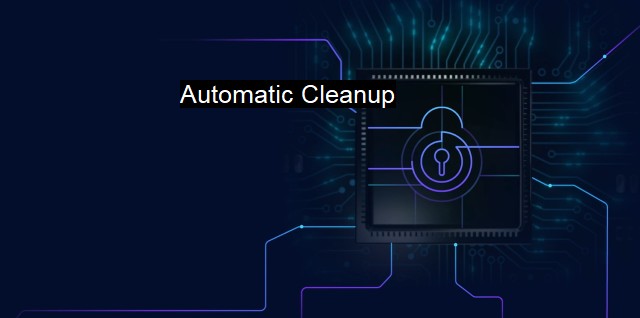What is Automatic Cleanup?
The Crucial Role of Automatic Cleanup in Cybersecurity and Antivirus Software
Automatic Cleanup is a crucial component in cybersecurity and antivirus operations, designed to identify and eliminate threats. It is an efficient process used by different antivirus programs and software and serves to ensure that a computer system performs at its nothing short of its optimum capacity, to maintain a clean environment, and secure personal data.The principle behind Automatic Cleanup lies in the ability to identify and isolate any form of malware (malicious programs) that poses a threat to the host system. Viruses, trojans, worms, rogues, rootkits, ransomware – all are forms of malware that can severely impede upon the security, privacy, and efficiency of a user's computer system, thereby compromising both its performance and the safety of the user's data.
Once the antivirus software detects any malware threats during a routinely performed examination or scanning of the system, it performs the Automatic Cleanup procedure. This means, the threats to your computer system are identified and removed without requiring direct user involvement. Not only does the action of automatic cleaning helps in promptly reacting and eliminating any potential dangers, but also significantly reduces the risk of human error that could arise due to inadequate knowledge or handling of the situation.
Despite falling under the same umbrella of security services, certain antivirus programs might offer varying functionalities and degrees of cleanup. Some merely quarantine the detected malware while others go a step further and delete them. Quarantining places infectious threats in a secure, isolated environment that prevents them from causing additional harm. These quarantined threats can be later investigated or deleted. On the other hand, deletion is an attempt to entirely eliminate the malware from the system.
Most importantly, the cleanup process does not limit its functionality to the hard disk only. The antivirus program thoroughly scans every area where threats could possibly lurk - the computer's memory, the operating system's files, installed software, and other vital parts for anything unusual. Cleaning these areas ensures comprehensive defense.
Automatic Cleanup is also beneficial regarding recovering infected files. Some advanced antivirus programs can perform automatic repairs, meaning if a valuable file gets infected by a virus, the antivirus software tries to cleanse the file from the virus, salvaging the original data in the process and leaving it unscathed, rather than just deleting the whole file.
Despite many advantages, there are certain drawbacks to Automatic Cleanup. This procedure must always be controlled and monitored by technical experts. The process may sometimes delete necessary files, often erroneously tagged as threats, leading to operational or functional disturbances in the system.
Knowledge and understanding of Automatic Cleanup assist users in optimizing their browsing experiences while also maintaining the security and privacy of their data. Recognizing the warnings and alerts provided by the software and responding timely in collaboration with automatic features can prevent grave oppressive situations caused by harmful malware.
Automatic Cleanup is a vital aspect of antivirus and cybersecurity measures - a process designed to ensure hassle-free, uninterrupted and secure computer usage. Through identification and removal of potentially harmful elements, this function works to maintain a clean, efficient and risk-free cyber environment for the user, striking an important balance between usability and security.

Automatic Cleanup FAQs
What is automatic cleanup in antivirus software?
Automatic cleanup is a feature in antivirus software that automatically removes or quarantines any infected files identified by the antivirus program. It helps to keep your computer safe from viruses and malware without requiring manual intervention.How does automatic cleanup work?
When antivirus software detects an infected file, it will attempt to remove the virus or malware from the file. If the infection cannot be removed, the antivirus software will quarantine the file and prevent it from executing. Automatic cleanup can be configured to operate silently in the background or to prompt the user before removing or quarantining infected files.Can automatic cleanup cause any problems?
In some cases, automatic cleanup can identify legitimate files as malware and quarantine or remove them. This is called a false positive and can cause issues if the file was important to the operation of a program or system. It's important to regularly check quarantine logs and exclude files from scanning if they are known to be safe.How can I enable automatic cleanup in my antivirus software?
Most antivirus software will have automatic cleanup enabled by default. However, it's always a good idea to check that it's enabled and configured correctly. Look for settings related to real-time protection, automatic scanning, and quarantine management to ensure that automatic cleanup is working as expected. If you're unsure, check the documentation for your antivirus software or contact technical support for assistance.| | A | | | B | | | C | | | D | | | E | | | F | | | G | | | H | | | I | | | J | | | K | | | L | | | M | |
| | N | | | O | | | P | | | Q | | | R | | | S | | | T | | | U | | | V | | | W | | | X | | | Y | | | Z | |
| | 1 | | | 2 | | | 3 | | | 4 | | | 7 | | | 8 | | |||||||